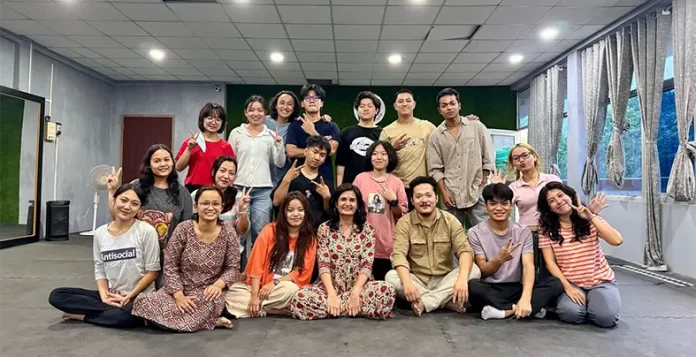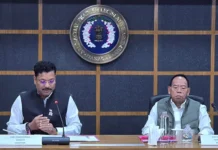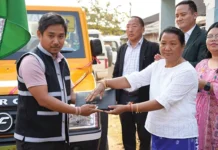[ Indu Chukhu ]
I recently joined an advanced acting workshop (AAW) for five days, organised by the Kamsa Dramatics Society (KDS).
Dr Meenu Hooda, professor and head of the department of screen acting at the state’s lone Film & Television Institute, Jote was the resource person on the first day of the workshop. This was my first time joining a dedicated workshop besides pursuing journalism. Honestly I had no idea what was going to happen with me, but I was very excited – and nervous, as well – as I had this preconceived idea that the resource persons at the workshop might directly teach us how to act and we would have to perform as we see others perform in theatres or on stage.
The AAW took place from 22 to 26 April. I informed our deputy editor that I would be attending the workshop for five days (meaning that I wouldn’t be able to work), to which she agreed.
On the first day, a session with Dr Hooda took away all our uneasiness and put us in a comfort zone. There were 13 students – some of them were first timers and the others had already done the first leg of training in different forms of acting.
Each day comprised six to seven hours of training. People of all age groups, students, working or non-working people come to such acting workshops whenever they are organised. This time, three seats were extended, besides the 10 allocated seats.
The room was filled with enthusiastic minds. Obviously, many first-timers like me had to go beyond their comfort zones for the exercises or tasks. Out of the many wonderful sessions/activities during the first day of the workshop, what stood out was the difference between ‘sympathetic’ and ’empathetic’ approach as an actor.
Dr Hooda said that when an actor is empathetic besides being sympathetic, one can play their role holistically.
On the students’ eager participation, she said, “I was greatly impressed by their honest approach towards their work, their keenness to learn, and their vulnerability.”
The workshop also navigated all aspects dealing with one’s inhibitions, tapping into one’s imaginative prowess, and extracting authentic emotional expression by making the students understand and follow their impulses. “Watching the students evolve in their craft and gain self-assurance was a deeply rewarding aspect of the experience by the end of the day,” Dr Hooda said.
She said that the students in Arunachal have immense potential, based on her experience with them. “Their raw talent, emotional depth, and natural ability to connect with an audience are great assets. Strong cultural influences and nuances of the state are ingrained in their personalities, and eventually reflect in their storytelling. They are so simple yet so deep. Their sensibility and understanding levels are impeccable. With the right kind of training and exposure, these students have the potential to thrive in professional acting spaces. Film & Television Institute, Arunachal Pradesh shall play a pivotal role in this,” Dr Hooda said.
She pointed out that limited opportunities could be a negative factor for aspiring actors, “but it is going to change soon as industry professionals and mentors have started looking towards the Northeast like never before.
“With the advent and growth of diverse platforms, nothing should stop the students from exploring the limitless world of acting here in Arunachal,” she said.
Wanggo Socia, a full-time research scholar at RGU and a native of Tirap district, said that he came to the workshop because of his love of art. Since he is a literature student, he had studied drama and theatre but had never experienced acting on stage, or as a performer on screen. He said that the idea behind joining the workshop was to learn how to express himself better, without any fear of judgement.
“Theatre art is an amazing job and I would always see it as a medium to really change the entire perspective of the society,” he said.
When asked if he connects theatre with the arts and culture of the Noctes, Socia responded, “Art is not only limited to writing and acting; we have different dimensions of art. This is something we inherit from our ancestors – the quality to see nature in artistic perspective. But if we look back, we have folktales and folklores and other traditions but never turned them into art.”
Namita Kar, in her early 40s, is an architect by profession. Speaking about the workshop, she said that she never in her wildest dream thought of doing acting. “I am a very shy person by nature. I was interested in dancing but limited only to closed rooms,” she said, adding that she came to know about the workshop through a cousin.
She said she was not very sure whether to join or not,especially with the age variations, despite her interest. “But with the support and encouragement from the KDS team, here I am on the final day!” she exclaimed.
Kar added: “Every day in the workshop, we go to learn, listen and explore our true selves, especially amongst unknown individuals. I believe every person should come forward for such acting workshops, irrespective of age, social profiles, religious beliefs and professions.”
Dolang Miko (18) a Class 12 student from Royal International School, Naharlagun, attended the workshop to improve her audition skills. This was her second acting workshop with the KDS. She had earlier taken part in a 10-day clowning workshop in June 2024, which was mentored by NSD alumnus Yash Yogi.
“If I get the opportunity, I will go for any kind of role as I have garnered the confidence and the prerequisites from this workshop on auditions, and even if I am not selected, I will keep open the room for improvement,” Miko said.
Edae Sonam (29) runs an NGO. She said that acting has been her passion since childhood but she never pursued it, owing to other responsibilities. “Initially I was sceptical and was very nervous as to how I would perform. When I started performing, I found everyone was so passionate and without any prejudice. Everyone is there for each other during the workshop, and it strengthened our bonding,” she said.
The youngest member of the workshop, Techi Yate (17), a Class 12 commerce student from Nichipu Children Foundation School, Hilltop, Itanagar, said that she was a little nervous about the workshop but later, after the first session, it all went well. “Initially I was under-confident, seeing my co-mates performing so well, but due to the positive ambience I did not fear to perform. The fear of what people would think and judge has gone away from me,” she said.
“Seeing Paalin sir (Paalin Kabak) in the movie Bhedia on screen and meeting him in person was a highlight, as he was so friendly and made us feel so comfortable. I don’t know if I was able to open up in acting or not, but I opened up on the path of life,”said Yate.
KDS curator, actor, theatre practitioner, and also the resource person of the workshop, Paalin Kabak described the trainees as very talented and active, and added that the students have high potential to become good performers in the future.
The KDS also holds ‘Sunday Monologues’ every Sunday in a month, where all the members of the KDS participate, interact and discuss. Sunday Monologues by the KDS takes place in an amphitheatre at Indira Gandhi Park due to the absence of any theatre workshops here in the city or in the state.
Till date there have been four stage performances and seven to eight workshops – including two children’s workshops – by the KDS.
Kabak said that there is huge potential for those who are passionate about the craft of acting. “The KDS’ Sunday Monologues and acting workshops provide a platform to shape the performance culture here in the state and the Northeast as a whole,” he said.
Kabak also noted that now the state government understands the power of theatre and performing art. “Participants are coming, getting to know about acting culture, be it theatre or stage. There’s a good future but we shouldn’t forget that Rome wasn’t built in a day. Theatre is new here in Arunachal; it is in the budding stage and we should consider that it is in budding stage,” he said.
The co-coordinators of the workshop were Bole Dawe and Dr Yomik Chisi.
The other participants of the advanced acting workshop were Heri Duri, Rosan Garam, Techi Konlo, Rowanco Tihak, Nathan Dawe, Gemar Kamki, and Janeth Pinggam.



